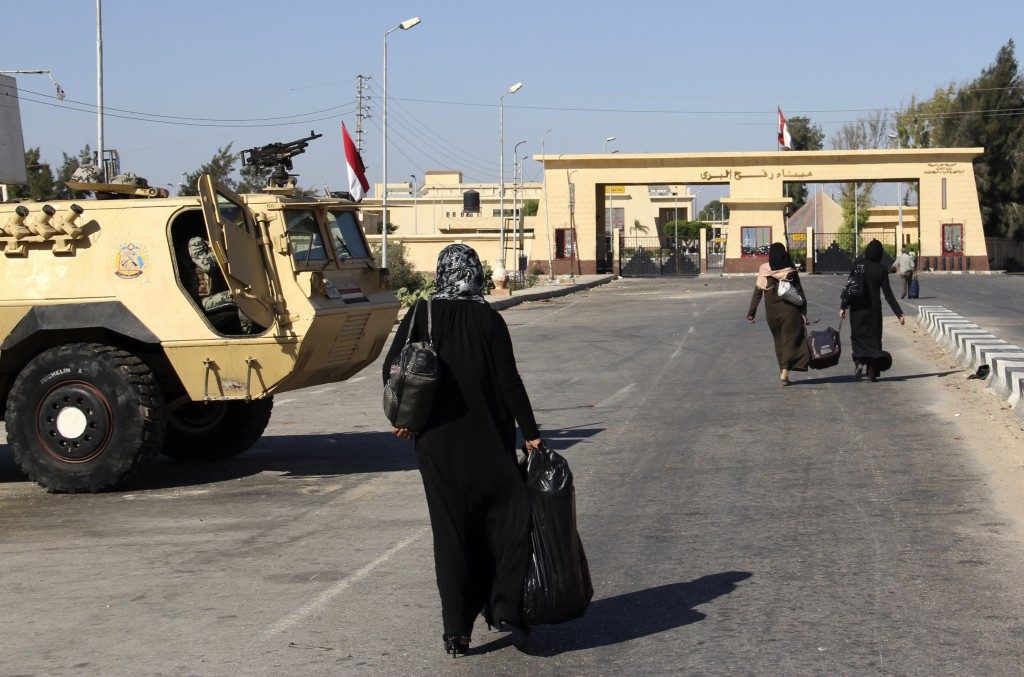AP photo
By
Maha Elbanna
As the bus took us through the sandy and rocky roads of the Egyptian town of Sheikh Zayed, I started to realize the huge destruction that has hit this part of Sinai. Demolished buildings, destroyed electricity poles and wires hanging on the road were an indication that this has almost become a ghost town. The few people that passed by looked as if they were walking in a dream, or rather a nightmare, and not a reality they have once lived through.
On Tuesday November 22, I was one of 30 Palestinian journalists travelling to Egypt as per an invitation by the al-Ahram newspaper. The aim of the visit was to discuss the role of media in supporting the Palestinian society and to talk about the possibilities of a new Egyptian role that can help ease the suffering of Palestinians living in Gaza Strip after long years of irregular operation of the Rafah terminal, the main gateway to the outside world for Gazans which has been closed for many more days that it has been opened in recent years.
This was my first time back in Egypt since 2013 and the changes I have seen and felt were scary. Our journey was not an easy one, and required massive coordination by Egyptian Intelligence with more than a dozen of army checkpoints that had to be passed on the way to Cairo; a trip that used to take 6-7 hours took us 13 hours on that day despite coordination of our movement.
We were allowed to stop shortly at a small cafeteria at the side of the road, one of tens that would normally have been open had the Rafah terminal been regularly operating. But this was not the case. After 2013, the Rafah portal has not been opening regularly. This situation worsened in recent years. Egyptian authorities cite the security situation in Sinai, as well as Palestinian internal division, as reasons for their inability to maintain smooth and regular operations at the borders.
In Cairo, and as I sat through the three sessions planned for us by al-Ahram newspaper and listened to speakers, I realized that there are some positive signals and that Egypt is seriously considering a new policy towards Gaza. Many have already been saying that the Egyptian government is looking into a number of steps that can help ease the suffering of Palestinians living in Gaza Strip. The enclave had been under Israeli blockade for nearly ten years, with very limited movement for people and a strict movement of goods. This situation was worsened with the closure of the Rafah crossing. New policies that can lead to an even partial opening of the Rafah crossing, and perhaps commercial movement between Gaza and Egypt can help improve the economy on both sides.
However, any possible change depends mainly on how Palestinians would react to any upcoming Egyptian initiative. Egypt is requesting PA officials be present at the Rafah terminal and not Hamas officials. This Egyptian request was made in 2014 and was unofficially renewed during our visit. On the internal level, Palestinians have been divided for almost ten years, with a political rift between the two main parties: Fatah, which leads the Palestinian Authority and has power in the West Bank, and Hamas which has control over Gaza Strip. Recent developments have also led to a Fatah-Fatah subdivision between head of the PA, President Mahmoud Abbas, and Fatah leader, Mohammed Dahlan. These divisions and subdivisions have been cited by Egyptian officials as weak spots for Palestinians which stand in the face of any progress in the Palestinian case as well as undermine their ability to have unified representation on the international level. During our visit, Egyptian officials suggested that the Palestinian media take up a more active role, standing to continued deterioration in the internal Palestinian situation and stopping incitement campaigns between all sides.
On the second day of our visit, we were hosted by the Middle East News Agency, where we listened to personal accounts of Egyptian journalists who had lived in Gaza previously. We also listened to views on how Media can and should be more involved in formulating policies related to the future of the Palestinian case. For entertainment, our trip included a visit to the Egyptian Media Production City where we learned about developments in the media field that have been taking place over the past years in Egypt and we visited state of the art studios and various shooting locations; an experience that is worth learning from.
Our journey was supposed to conclude on Friday, November 25, but had to be pushed back until Saturday after an attack on one of the army points in Sinai on Wednesday left 8 soldiers dead and several others injured. This has left me tremendously sad knowing that some of the young men we met on our way to Cairo only a few days earlier had been killed as they stood out there in the desert trying to protect their country.



No Comments Yet!
You can be first to comment this post!